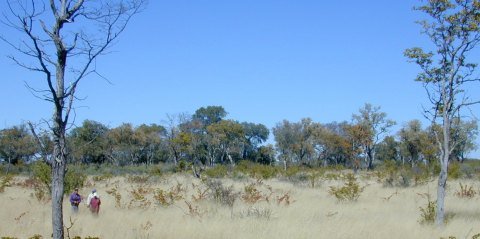Home | About CCW | Contact Us | Climate change Meaning | Causes | Solutions | Emissions | Carbon trading
What is climate change?
Before we can answer the "what is climate change" question it is worth thinking a little on what we mean by climate.
Imagine it is August and you find yourself in southern Africa, let’s say just outside Gaborone the capital city of Botswana. It is midday and you look up. What you will see is a blue sky. That classic deep, clear and reassuring blue that business people like to use on their websites. And, come 6pm when the sun goes down, you will need a sweater but you can leave your umbrella in the closet.
This is because at this time of year stable high-pressure cells persist for weeks on end right across southern Africa. The air is dry and the temperature crisp. It will not rain until October at the earliest, save for the rare drizzly morning when the tail of a big weather front passing over Cape Town brushes the interior.
In winter the weatherman on Botswana television has a very repetitive job. Mostly he gets to describe this…

The dictionary defines climate as the prevailing weather conditions of an area or a region with particular weather conditions.
It is possible to describe a set of physical phenomena – temperature, rainfall, storms, clarity of the sky – as climate, especially if they are predictable for a given place.
What is climate change? Really it is change the predictability of the weather. That is change in the pattern and consistency of events more than just sunny or rainy days, or a hot, dry spell.
Putting details on the answer to the "What is climate change" question is a scientific challenge.
The use of methods to observe, measure and analyze these physical things is what scientists do. Likelihood is that if you actually went to Botswana, which is an excellent thing to do by the way, you would not be too worried about reading a thermometer.
You would, however, feel the warmth of the sun pushing through the cool winter air. You would feel the climate rather than measure it.
This is the first challenge of definition and an answer to the ‘what is climate change’ question. The technical and physical definitions of climate do not cover everything that we know and feel.
It is a hint of the conundrum before us that the alternative definition of climate change, and another answer to the what is climate change question, is the prevailing trend of opinion or public feeling.
When scientists ask what is climate change they opt for a technical definition then detect when there is a recognizable shift in the observations. Climate changes when temperature, rainfall pattern, atmospheric pressure and a bunch of other measurable parameters move away from the norm.
Scientists apply mathematical and statistical tools to help define both the ‘norm’ and when observations are outside the norm. They use this numerical approach as the basis for evidence of climate change.
We will see that this objectivity of science is not as easy to pin down as it seems or as it should be. After all, most of us rely on the scientists for our facts. And we expect what they deliver to be objective.
So, strictly, climate change is a change in the sequence of the weather experienced at a given place. At least this is how our scientific friends would describe it. They then work hard to get the numbers and graphs presented so we can see what they mean by change.
The interesting thing is that, as Mike Hulme has very eloquently described in his book Why we disagree about climate change, climate change is also an idea.
Unlike with numbers and statistical tests of difference, it is not just the scientifically minded who get to play with an idea; we all do.
We can all own an idea.
Ideas hatch in a mind but they are social things that can bounce around in politics, economics, popular culture, commerce or religion. And they can be debated in all these arenas.
Climate change is a great idea because, as Mike Hulme points out, it:
- is controversial and we all like to argue
- can be a handy way to make money (cut across to emissions for an explanation of why)
- inspires our passion
- threatens our security
This list of attributes makes it stick as it tweaks all of us in one-way or another.
Most ideas also share another attribute. They are ambiguous. You may need to dig a little deeper to help decide what climate change means for you.
Here are some pages that might help:
Climate change and human evolution
Is it global warming or climate change?
Scientific opinion climate change
The great global warming swindle

Back to top of What is climate change? | Return from What is climate change to Climate-change-wisdom home page
Recent Articles
-
Reducing emissions while looking for solutions...
Nov 01, 15 04:46 PM
I've seen a lot of post's online for ideas on reducing emissions. The one suggestion I have not seen, is the most obvious. There should be a government -
Climate change evidence
Mar 24, 15 06:22 AM
Real climate change evidence has to demonstrate a change in climate. An extra sunny day or a severe storm or a flood is not enough. -
The climate change effect
Feb 19, 15 03:08 AM
What will be the climate change effect? There isn't one, there are many. Perhaps too many for us to understand.

New! Comments
Have your say about what you just read! Leave me a comment in the box below.